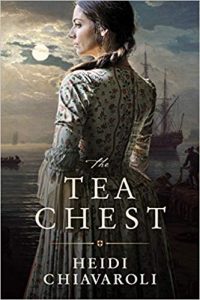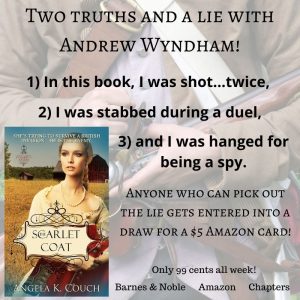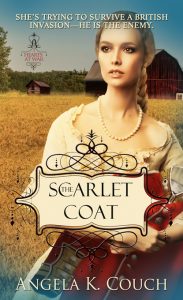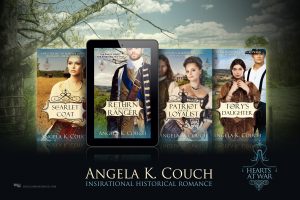I’m so thrilled to welcome women’s fiction/split time author, Heidi Chiavaroli, to Romancing History today. I had the pleasure of getting to know Heidi when I snagged a coveted position on the launch team for her third novel, The Edge of Mercy.
Heidi’s most recent novel, The Tea Chest, released earlier this month and is a stand alone split time story. I’m sure my Romancing History readers won’t be surprised to learn that the historical thread is my favorite. I really enjoyed this book (see my review) and was tickled when Heidi said she’d do an interview with us.
Heidi has graciously offered a signed copy of The Tea Chest to one lucky Romancing History reader. To enter, see the details in the Giveaway section at the bottom of this post.
Before we chat with Heidi, here’s a little bit about her and her new book.
About Heidi
 Heidi Chiavaroli (pronounced shev-uh-roli…like Chevrolet and ravioli mushed together!) wrote her first story in third grade, titled I’d Cross the Desert for Milk. It wasn’t until years later that she revisited writing, using her two small boys’ nap times to pursue what she thought at the time was a foolish dream. Despite a long road to publication, she hasn’t stopped writing since!
Heidi Chiavaroli (pronounced shev-uh-roli…like Chevrolet and ravioli mushed together!) wrote her first story in third grade, titled I’d Cross the Desert for Milk. It wasn’t until years later that she revisited writing, using her two small boys’ nap times to pursue what she thought at the time was a foolish dream. Despite a long road to publication, she hasn’t stopped writing since!
Heidi writes women’s fiction, combining her love of history and literature to write split time stories. Her debut novel, Freedom’s Ring, was a Carol Award winner and a Christy Award finalist, a Romantic Times Top Pick and a Booklist Top Ten Romance Debut.
Heidi loves exploring places that whisper of historical secrets, especially with her family. She loves running, hiking, baking, and dates with her high-school sweetheart and husband of sixteen years. Heidi makes her home in Massachusetts with her husband and two sons.
Connect with Heidi
Website Facebook Twitter Instagram GoodReads BookBub
About the Book
 Boston, 1773
Boston, 1773
Emma Malcolm’s father is staunchly loyal to the crown, but Emma’s heart belongs to Noah Winslow, a lowly printer’s assistant and Patriot. But her father has promised her hand to Samuel Clarke, a rapacious and sadistic man. As his fiancée, she would have to give up Noah and the friends who have become like family to her―as well as the beliefs she has come to embrace.
After Emma is drawn into the treasonous Boston Tea Party, Samuel blackmails her with evidence that condemns each participant, including Noah. Emma realizes she must do whatever it takes to protect those she loves, even if it means giving up the life she desires and becoming Samuel’s wife.
Present Day
Lieutenant Hayley Ashworth is determined to be the first woman inducted into the elite Navy SEALs. But before her dream can be realized, she must return to Boston in order to put the abuse and neglect of her childhood behind her. When an unexpected encounter with the man she once loved leads to the discovery of a tea chest and the document hidden within, she wonders if perhaps true strength and freedom are buried deeper than she first realized.
Two women, separated by centuries, must find the strength to fight for love and freedom. . . and discover a heritage of courage and faith.
Amazon Barnes & Noble CBD
Interview with Heidi
Fast Five
- Dogs or Cats? Dogs most definitely.
- Coffee or Tea? Tea all the way.
- Bookmark or Dog Ear Pages? And hurt the book?! Bookmark!
- Kindle or Paperback? Paperback. I tried to get into digital reading but for me, there’s just something about the experience of holding a book with pages.
- Night Owl or Early Bird? Early bird. I’m usually ready for bed by 9!
Q & A
RH: Heidi it’s been fun getting to know you through your launch team. Can you share something unusual about yourself with my Romancing History readers? Something not in the typical back of the book author bio—something quirky.
HC: I’m a bit obsessive compulsive about a clean house. I have one day a week that I set aside for cleaning and groceries, and I have trouble ignoring this day even when I’m on deadline. I simply can’t concentrate if it’s not done!
RH: I like a tidy house, too, but if I’m cleaning toilets either company is coming over, or I’m avoiding edits or writing a tough scene. Fans of romantic fiction love a cute meet. How did you and your significant other meet?
HC: The first time I saw my husband we were freshmen in high school. I will always remember that day because he looked just like a boy I dreamed about the year before. (Not kidding!) But we didn’t hang out much. He was a vocational kid and I was busy with my honors classes. It wasn’t until senior year that he came up to me at lunch and asked me out. The rest is history!
RH: Aww, that’s so cute. I love hearing how people meet their spouse. What do you like to do when you’re not reading or writing?
HC: I love to hike. I also love to quilt, cross-stitch, watch movies with my family, bake, dance in my kitchen, and sing.
RH: Wow! You have such a wide variety of hobbies and talents! I love to sing around the house as well but I “can’t carry a tune with a handle on it” as my mama always said (and my hubby would whole-heartedly agree). When did you know you wanted to write?
HC: Ever since early elementary school, when I discovered the library and the power of a story, I wanted to write. In third grade, I attempted my first novel, I’d Cross the Desert for Milk. A masterpiece! 😉
RH: I love that you still remember the title of a story you wrote in third grade! That’s adorable! What unpublished story do you have in your stash that you really hope sees the light of day someday?
HC: The second story I wrote, which actually won ACFW’s Genesis contest in 2014, is a historical novel based on a leper colony off the coast of Massachusetts in the early 20th century. For so many reasons, that’s the story of my heart. It needs a bit of work, and I’m not really sure how many readers want to spend time in a leper colony (I would, but that’s another one of my quirks!), so who knows if it will ever actually see the light of day.
RH: Wow, what a unique idea. As a lover of history, I think that would be a fascinating read!What was the inspiration behind your recent novel?
HC: This inspiration definitely came slowly for me! Since I knew I wanted to write about the events of the Boston Tea Party, I dove into researching everything I could about the circumstances surrounding it. My historical heroine, Emma Malcolm, was birthed when I read an account of the brutal tarring and feathering of customs official John Malcolm. This servant of the crown was quite a character in his own right—very outspoken and stubborn with no patience for the antics of the Patriots. And yet I found myself feeling compassion for him. He was treated cruelly and inhumanely by those we find ourselves lauding as heroes today.
I imagined what it’d be like if he had a daughter—one who sympathized with the Sons of Liberty…one who sympathized with the very political side her father was intent on squelching. What if his daughter befriended those plotting to dump the tea? What if she aided them? What if she were even in love with one of them?
Once I had the historical story line down, I thought it might be fun to explore a contemporary woman who also longs to fight for her country and prove herself the best way she knows how. In my research about women in the military, I learned that in July 2017, it was announced that for the first time, a woman would enter the training pipeline to become a Navy SEAL. I imagined what this unidentified woman had gone through and what propelled her to enter such rigorous training. I decided to explore her story in fiction.
Emma and Hayley, my contemporary heroine, both long to serve their country despite broken families. They both long to prove themselves and seek a greater worth and identity.
RH: I really like the aspect that your heroines, though separated by nearly 250 years, were both seeking to belong and found that new identity in Christ. If you were to pick a particular Scripture verse as the theme of your novel, what would it be? Why?
HC: 2 Corinthians 5:17 “If anyone is in Christ he is a new creation; old things have passed away; behold all things have become new.”
The Tea Chest explores what it means to find our worth not in our past, not in what we do or how well we do it, but in whose we are, and in who we trust in.
RH: Amen. When and where is your story set?
HC: Colonial Boston/1770s
RH: My husband and I celebrated our 25th anniversary in Boston a few years ago. They’ve done such a fantastic job preserving our heritage. Fans of historical fiction & romance love the details that your research provides. Was there anything particularly interesting that you learned while researching your book that you were able to use or not use in your story that you’d like to share?
HC: Before I did the research for this book, I really didn’t understand the concept of tarring and feathering. All the colonial cartoon pictures depicted it as an almost funny event—a full grown man with a coat of feathers being paraded through the streets. Sounded silly to me! Not until I dove into my research did I really begin to understand how humiliating and dangerously painful this experience was. Those Patriots could certainly be brutal!
RH: I had no idea either until I read The Tea Chest. That was the first time I actually thought about how painful tarring & feathering must have been. I thought you portrayed that very well. Which secondary character do you think will resonate with readers? Why?
HC: Sarah Bradlee Fulton was a real historical person, but in The Tea Chest she is a friend and mentor to my historical heroine, Emma. Sarah is given credit for coming up with the idea of Mohawk disguises the night of the Boston Tea Party. She also did some other pretty courageous things to help the cause of the Patriots. Her bold courage inspired me, and I hope she will inspire readers!
RH: I did love Sarah’s strength of character and commitment to help the cause of Independence. Her determination was definitely inspiring. What do you hope readers will take away from your story?
HC: I hope readers are touched by the ultimate hope the characters find. I hope they feel it is possible to break away from a troubled past, to make peace with it, and to find renewed hope in a God who loves them.
RH: Yes, I loved the theme that you are not defined by your past or your family, but by the choices you make. The most important being where you place your hope and trust. What are you working on now?
HC: I just finished edits for my next book with Tyndale, scheduled for release next year and tentatively titled The Orchard House. So I’m in the wonderfully beautiful place of dreaming up a new book!
RH: I’ve really enjoyed your stories, Heidi, and look forward to your next release. I’m just not sure I’ll be able to wait an entire year! I had so much fun chatting with you today. Thanks for visiting with my readers.
Giveaway**
This Giveaway is now CLOSED! Congratulations to Connie Porter Saunders, the winner of the signed copy of The Tea Chest!!!
In The Tea Chest, Heidi’s historical heroine, makes a choice to leave her loyalist family and join the Patriot cause defying not only her strict father, but societal expectations. But not all men and women of that day agreed with cause of liberty. Many identified as English subjects and chose to remain loyal to the crown. If you lived in Boston on the eve of the American Revolution, would you fancy yourself a Patriot and risk being labeled a traitor? Or would you feel the moral road led to working with the crown to resolve your problems and remain a Loyalist? Tell us why in the comments below to be entered to win the signed copy of The Tea Chest.

















